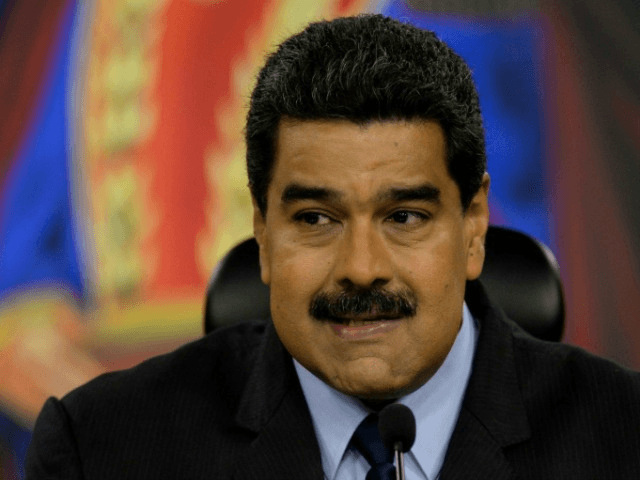Venezuela’s socialist dictator Nicolás Maduro met Sunday with prominent Middle East presidents Recep Tayyip Erdogan of Turkey and Hassan Rouhani of Iran, seeking support amid a global outcry against his regime.
While Maduro’s state-run VTV prominently advertised the meeting with Erdogan on its website, state-run Turkish media outlets did not promote the meeting.
VTV reports that the two world leaders “met on Sunday … to evaluate the state of relations between both countries” at the Organization of Islamic Cooperation (OIC) in Astana, Kazakhstan. The outlet claims Maduro and Erdogan reaffirmed “cooperative ties in energy and commercial exchange” and that Venezuela has purchased $500 million in Turkish exports in the past four years.
#IMÁGENES #INTEGRACIÓN Venezuela y Turquía consolidan alianzas estratégicas #VenezuelaDignidadGlobal pic.twitter.com/tHrKPScWIV
— Prensa Presidencial (@PresidencialVen) September 10, 2017
Maduro, a longtime ally of the Shiite regime in Tehran, also met with Rouhani during the OIC. Iran’s state-run propaganda outlet PressTV framed the conversation between those two leaders as an affirmation of their hatred for the United States. “We have no doubt that the new methods of the US government cannot last for long,” Rouhani reportedly told reporters at the summit. “In their talks, Rouhani underlined the need for continued consultations among OPEC and non-OPEC members and hailed Venezuela for helping stabilize crude oil prices,” PressTV claims.
The outlet also quotes Maduro as saying that Venezuela has “witnessed invasive maneuvers and meddling by the US, especially over the past six months, but we will stand against these pressures by preserving our unity.”
Maduro has accused the U.S. government under both presidents Barack Obama and Donald Trump of organizing coup attempts against him, though he has never presented any evidence to justify his claims.
During his stay at the OIC, Maduro also reportedly announced that Venezuela would no longer only use American dollars to trade with other countries. “I have decided to start selling oil, gas, gold and all other products that Venezuela sells with new currencies, including the Chinese yuan, the Japanese yen, the Russian ruble, the Indian rupee among others. An economy free from the U.S. imperialist system is possible,” Maduro said.
Venezuela is home to the world’s largest known oil reserves, yet it is suffering one of the world’s highest inflation rates and, under both Maduro and predecessor Hugo Chávez, has become an impoverished dictatorship. Many Venezuelans are forced to eat dogs, steal zoo animals, and dig through garbage for food to survive. Maduro has imposed strict price controls and rations—controlled by the nation’s military—that leave many with no means to purchase basic items such as milk, flour, and vegetable oil.
Socialist Venezuela has close ties to Iran and its terrorist proxy organization Hezbollah. The nation’s vice president, Tareck El Aissami, has seen his name surface in various investigations as an alleged Hezbollah recruiter and liaison between his government and Tehran. Maduro himself has visited Iran on multiple occasions and maintained ties with the Shiite regime.
“Iran is very heavily involved in Maduro’s Venezuela and was under Chavez, too,” former American ambassador to the UN John Bolton explained in August. “The largest Iranian embassy anywhere in the world—why in Caracas? Because they’re laundering money through it and because Venezuela, next to Canada, has the world’s largest proven uranium reserve.”
Venezuela has not had traditionally strong ties to Turkey, however. Erdogan’s is an anti-communist government engaged in intense military battles with the Marxist Kurdistan Workers’ Party (PKK) in the nation’s south. Erdogan has nonetheless maintained business ties to Venezuela—as well as other Marxist countries in Latin America like Venezuelan host regime, Cuba—and expressed interest in expanding the reach of Islam throughout Latin America.

COMMENTS
Please let us know if you're having issues with commenting.